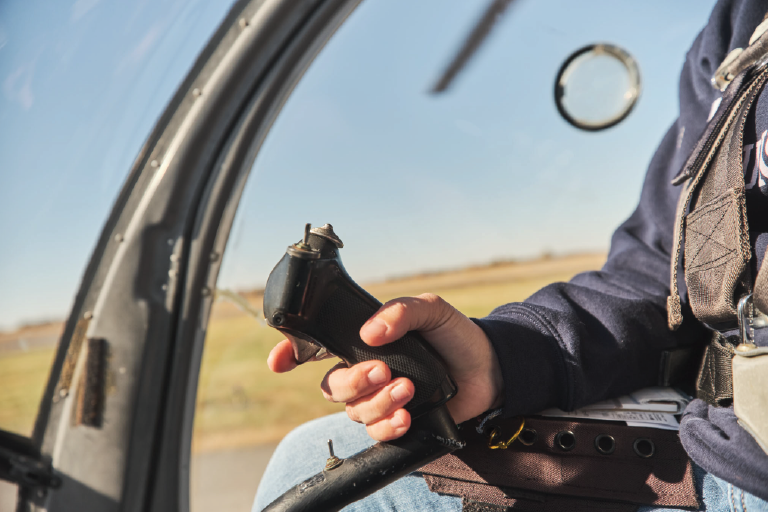What are Aviation Programs?
MCC Aviation programs provide students with the knowledge and skills required to enter the exciting world of professional aviation.
While you earn the Associate of Applied Science degree, you will also earn the FAA ratings required to become a professional pilot. Specifically, the private pilot certificate, instrument rating, commercial pilot certificate, multi-engine rating (airplane track), and the Certified Flight Instructor (CFI) certificate. Certified Flight Instructor Instrument (CFII) certificate and Multiengine Instructor (MEI) ratings are available. Helicopter flight students will earn the private pilot certificate, instrument rating, commercial pilot certificate, and the Certified Flight Instructor (CFI) and Certified Flight Instructor Instrument (CFII) certificates. Program requirements will reflect FAA and industry standards to the greatest extent possible.
Individual courses may also be taken by anyone wanting to complete a ground school or take a refresher course. Classes may be taken for credit or non-credit. Contact us whether your goal is to get your private pilot certificate, add an instrument rating, or to become a commercial pilot. We can help — after all the sky is the limit!
Before you enroll in this program, first please contact us so we can answer your questions about our program and about aviation as a career. Our class schedule will normally provide two aviation classes that you should take each term after the initial semester. It is recommended that students take FWT 101 Private Pilot (Airplane) or HFT 115 Private Pilot (Helicopter) ground school the first term it is available. These are the foundational courses upon which all other aviation classes are based and will get you in the air at the earliest opportunity.
What are you waiting for? Let's go FLY.
What are my career choices?
Graduates of an Aviation Program will be highly trained and competent aircraft operators who are not only responsible for the safety of their passengers and cargo, but also for the operation of sophisticated and expensive equipment.
Program completers of the proposed Helicopter Flight Training (HFT) degree program will have completed all the academic training required to take the FAA; Private Pilot, Commercial Pilot (Helicopter), Certified Flight Instructor (CFI-Helicopter) and CFI-Instrument-Helicopter (CFI-I) examinations. Pilots with a Rotorcraft (helicopter) Commercial Pilot certificate and/or instructor credentials will find employment in a variety of helicopter applications such as corporate flight operations, charter or cargo airlift, agricultural services, surveying, law enforcement, search and rescue, on-demand media, emergency medical evacuation, flight training, or with numerous government agencies. Demand for qualified pilots is high and increasing across the country.
Graduates of the Professional Pilot Fixed Wing degree program will have completed all academic training required for the airplane commercial pilot and flight instructor certificates and are immediately employable in the aviation industry. Pilots with a commercial pilot certificate and instructor credentials may find employment with regional and major airlines, corporate flight departments, charter or cargo operators, agricultural flying, flight schools, or with a government agency.
Non-flying positions are also available with the Federal Aviation Administration or other federal, state, and local aviation agencies.
What are my degree, diploma, or certificate options?
Degrees
- Associate in Applied Science - Helicopter Flight Training
- Associate in Applied Science - Fixed Wing Flight Training
In addition to the Associate in Applied Science degree, students completing coursework may be able to qualify for Federal Aviation Administration certifications and five aeronautical ratings in less that 24 months.
- FAA: Private Pilot Ground School - Fixed Wing
- FAA: Private Pilot Certification - Fixed Wing
- FAA: Instrument Pilot Ground School - Fixed Wing
- FAA: Instrument Pilot Certification - Fixed Wing
- FAA: Commercial Pilot Ground School - Fixed Wing
- FAA: Commercial Pilot Certification - Fixed Wing
- FAA: Certified Flight Instructor Ground - Fixed Wing
- FAA: Certified Flight Instructor Certificate - Fixed Wing
- FAA: Flight Instructor Instrument Ground - Fixed Wing
- FAA: Flight Instructor Instrument Certification - Fixed Wing
- FAA: Multi-Engine Pilot Certification - Fixed Wing
- FAA: Private Pilot Ground School - Helicopter
- FAA: Private Pilot Certification - Helicopter
- FAA: Instrument Pilot Ground School - Helicopter
- FAA: Instrument Pilot Certification - Helicopter
- FAA: Commercial Pilot Ground School - Helicopter
- FAA: Commercial Pilot Certification - Helicopter
- FAA: Certified Flight Instructor Ground - Helicopter
- FAA: Certified Flight Instructor Certificate - Helicopter
- FAA: Flight Instructor Instrument Ground - Helicopter
- FAA: Flight Instructor Instrument Certification - Helicopter Fixed Wing
Admission Requirements
Aviation Programs are selective admission only. Specific course prerequisites will apply and the program will be constrained by the equipment (aircraft) available to support student learning.
There are Federal Aviation Administration (medical) and Department of Homeland Security requirements with which students must comply prior to admission.
Scholarship Information
Students majoring in Aviation Programs may be eligible for scholarship support through the Financial Aid Office.
Length of Program
You can earn the associate in applied science degree in two years if you maintain full-time status and at least 15 credit hours per term.
This information should not be considered a substitute for the KCTCS Catalog. You should always choose classes in cooperation with your faculty advisor to ensure that you meet all degree requirements.
Essential Progam Information
All students are required to meet English language proficiency at minimum ICAO Level 4.
Private Pilot
- Age: 17 or older
- Total Flight Time: 40 hours
- Tests & Exams: Knowledge test and practical (flight) exam
Commercial Pilot
- Age: 18 or older
- Total Flight Time: 250 hours
- Tests & Exams: Knowledge test and practical (flight) exam
Airline Transport Pilot
- Age: 21 or older
- Total Flight Time: 1500 hours
- Tests & Exams: ATP CTP, Knowledge test and practical (flight) exam
U.S. Citizens
Students: Bring appropriate evidence of citizenship with you to school. Evidence of U.S. citizenship must be shown by one of the following:
Valid, unexpired U.S. passport, or
a. government-issued picture ID card and
1. Original birth certificate of the United States, American Samoa, or Swains Island,
or
2. Original certification of birth abroad with raised seal (Form FS-545 or DS-1350),
or
3. Original certificate of U.S. citizenship with raised seal (Form N-560 or N-561),
or a Certificate of Repatriation (Form N-581, or
4. Original U.S. Naturalization Certificate with raised seal (Form N-550 or N-570).
Aliens
An alien is defined as any person not a citizen or national of the United States. This also refers to resident aliens (green-card holders) and visa holders in the United States.
The Alien Flight Student Program (AFSP) conducts background checks for non-U.S. citizens
seeking flight training. Prior to obtaining flight training non-U.S. citizens must
apply online through the AFSP website and provide their fingerprints, biographical
information, security documents including passport copies, and specific information
about their desired training events.
The candidate must notify the school that they are a resident alien.
Provide the aviation department with his/her visa, passport, and a current photograph when registering at the school. The aviation department will upload copies to the TSA website. The candidate is required to create a login account at https://www.flightschoolcandidates.gov.
The candidate will be required to submit the following information:
Background Information. Full name, gender, current address and five-year address history, date and country of birth, and citizenship information.
Passport and Visa Information. Foreign applicants are required to have a passport. A candidate may either scan his or her complete passport and submit it to TSA electronically, or copy his or her complete passport and fax it to TSA using the fax number provided on the AFSP Web site.
Training Details. Basic information including the name of the school, course name, course description and ID number, type of aircraft, pilot certificate or rating sought, and the start and end dates for the flight training.
Fingerprints.
$130 Application Processing Fee.
Photo.
The following links make also be helpful.
AFSP Help Desk Phone - 571.227.4544
AFSP E-mail -AFSP.help@dhs.gov
A student interested in registering for MCC credit courses, certificates or degrees will begin by completion of the on-line application will expedite your admission process; however, paper applications are also available.
Start by visiting the https://madisonville.kctcs.edu/admissions/index.aspx to learn the process, programs offered and requirements. Once you apply for admission you will be assigned a student ID number.
Determine how you will pay for college
Certain classes will have flight training and simulator fees attached that are quite expensive. The program qualifies for federal financial aid. Flight fees charged by the college are generally based on the hours required to successfully complete semester objectives and not to any specific level of FAA proficiency. Students who require additional flight, ground, or simulator training may incur costs that exceed the fees advertised in the current academic year catalog in order to gain FAA proficiency for a given rating. The student would be responsible for those additional fees and must fund their student account prior to the commencement of any additional, or add-on training. Alternative loans may be available to cover flight fees beyond the federal financial aid.
Develop a plan for college success
Organize your life to have time to learn
Build a degree plan with your advisor
Tour the MCC Campus and learn where your classes will be located.
Learn technology used at MCC.
Learn how to get involved on campus - activities, jobs and clubs
Meet with a program advisor
All first time degree-seeking students are required to talk with an advisor so they can be cleared to register for classes. If you are aviation major, you should talk to Todd Smith at 270-824-8589 before committing to the program so you learn the program specific requirements. This is an expensive major so you must be prepared for the cost of flight training in addition to the normal tuition and fees.
FAA Medical Certificate
Students are required to get an FAA medical certificate before starting the aviation program. Go to https://www.faa.gov/pilots/medical_certification for more information.
Student Pilot's Certificate
You must complete an application through the Integrated Airman Certification and Rating Application (IACRA) website or by paper using FAA form 8710-1 and submit it to a Flight Standards District Office (FSDO), an FAA-designated pilot examiner, an airman certification representative associated with a part 141 flight school, or a certificated flight instructor. The authorized individual will process your application and submit the required documents to the Airmen Certification Branch. Once, reviewed by Airman Certification Branch, the student pilot certificate will be mailed to the address provided by you on the application.
TSA Security Requirement
The Transportation Security Administration (TSA) requires us to verify a student's citizenship status. See the National Aviation Security information page on this site for more information.



